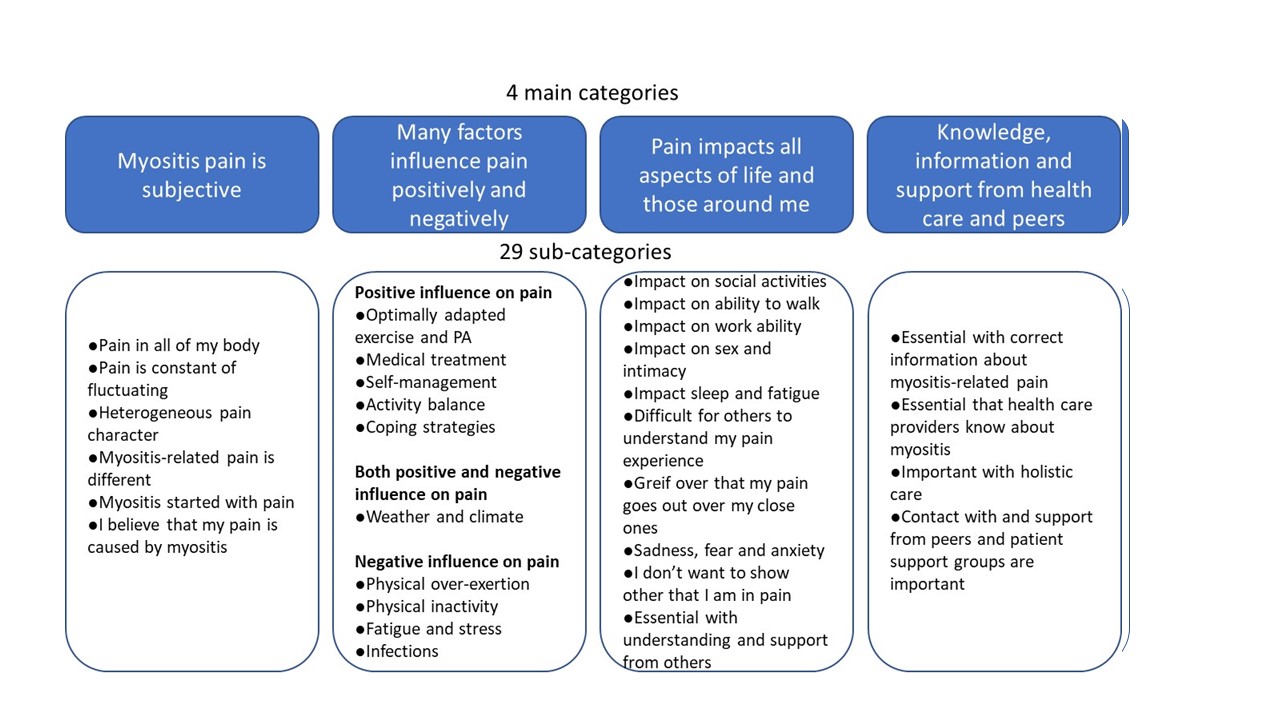Session Information
Date: Monday, November 13, 2023
Title: (1155–1182) Muscle Biology, Myositis & Myopathies – Basic & Clinical Science Poster II
Session Type: Poster Session B
Session Time: 9:00AM-11:00AM
Background/Purpose: Knowledge of pain in myositis is limited. Recent research suggest that pain is a common symptom in adults with myositis and deemed as one of the most important symptoms to assess in clinical trials and clinical care1. The aim of this study was to explore experience of pain in adults with myositis.
Methods: Informants were strategically identified to represent women and men, various age, myositis-diagnosis, diagnosis duration and self-reported pain (≥ 30 mm VAS). 10 adults with polymyositis (n=5), dermatomyositis, (n=3), and antisynthetase syndrome (n=2), 6 women, age range 24-68 years, participated in an individual interview. A semi-structured interview guide was used. Interviews were audiotaped and transcribed verbatim and analyzed by inductive qualitative content analysis. Briefly, transcripts were read by MT,HA separately, identifying meaning bearing units and discussed until consensus, developing condensates, codes and categories. Data were triangulated until consensus (HA,MR,HP).
Results: Four main categories and 29 sub-categories were identified (Figure 1). Main categories: 1. Myositis pain is subjective(example codes: Burning pain, tenderness and tensed muscles, Constant pain in my arms, Pain was first symptom of myositis.)2. Factors influencing myositis positively and negatively(Exercise reduce pain, Balancing activities and rest reduce pain, Be positive and happy and not focus on the pain, Prednisolone reduce pain, but pain return with tapering of dose,increased pain when I am inactive.)3. Pain impacts all areas of my life and those around me(Pain hinders family activities, Difficult to accept that sex no longer is part of my life, Pain reduces sleep quality, Sad that I feel like a burden to others.)4. Knowledge, information and support from health-care and peers(Lost a lot of time due to incorrect information, Listen to your doctor, Meet others with myositis for support and tips).
Conclusion: Pain is an important symptom in myositis affecting many aspects of life and family/friends. Myositis-related pain is heterogeneous as to character, localization, and duration. Although relieved by medical treatment and adapted exercise, pain can remain as a chronic symptom. Health-care professionals should ask patients about myositis-related pain, and address pain by adequate treatment and information.
To cite this abstract in AMA style:
Alexanderson H, Tasaroffi M, Pettersson H, Regardt M. Experience of Pain in Adults with Idiopathic Inflammatory Myopathies, Myositis [abstract]. Arthritis Rheumatol. 2023; 75 (suppl 9). https://acrabstracts.org/abstract/experience-of-pain-in-adults-with-idiopathic-inflammatory-myopathies-myositis/. Accessed .« Back to ACR Convergence 2023
ACR Meeting Abstracts - https://acrabstracts.org/abstract/experience-of-pain-in-adults-with-idiopathic-inflammatory-myopathies-myositis/

